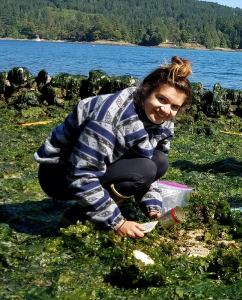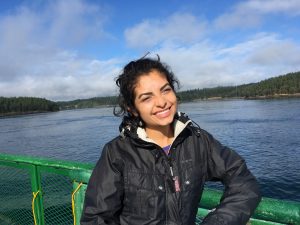Alexandra Trejo
Undergraduate, B.S. Environmental Science
Throughout her life, Alex has had a passion for the natural world as well as to help others, especially those who have been at a disadvantage in modern society. Unsure of how her passions could combine into a career, Alex felt indecisive of her career path until she started working in the Coastal Communities and Ecology Lab, where she found intersectionality between scientific research and social justice. Currently, Alex is pursuing a degree in Environmental Science with minors in GIS And Spanish. She hopes with these assets that she will be able to assist in future community-driven research and finds particular interest in working with indigenous communities as she feels those who are most knowledgeable about the land are often those whose families have traditionally inhabited it.
Outside of the lab, Alex works at the Center for Education, Equity and Diversity on campus where she challenges herself and peers to cultivate a more critical consciousness. Additionally, she addresses inclusion and diversity issues in STEM by being involved with the WWU chapter of the Society for Advancement of Chicanos and Native Americans in Science for which she was a board member of this past year in addition to being a recipient of an award for her research presentation at the national conference in Salt Lake City, Utah in October 2017. When not on campus, Alex is usually found either in a crowd supporting local art and music or in the solitude of nature, enjoying different forms of outdoor recreation. Entering her fourth year of college in the fall, Alex will be taking a break from the lab to study abroad in Montevideo, Uruguay where she will continue to work on her Spanish fluency.
Celida Moran
Undergraduate, B.S. Environmental Science
Throughout her childhood, Celida enjoyed being in nature whether it meant going to the beach, a day out in Golden Gate Park, or some urban hiking on one of San Francisco’s many hills. She decided to become a marine conservation scientist but noticed and felt the impacts of the lack of diversity in the field. Celida plans to use a degree from Huxley College of the Environment, the cultural strength from her Mexican, Salvadorian and Nicaraguan family, and the lessons from her friends and mentors in her communities of Color to promote community-based research that works not only toward stewardship of the Earth but also toward the environmental justice and representation that is lacking in the conservation field.
Dr. Marco Hatch and the welcoming team he has cultivated in his lab have opened her eyes to such work and inspire her every day. The Coastal Communities and Ecology Lab acts as a nexus for diverse students, scientists, opinions and knowledge that constantly develop her understanding of community, implementations of science and her place in the Salish Sea. With the lab’s help, she will build upon the tools they have given her through the two years Doris Duke Conservation Scholars Program in which burgeoning members of the conservation discipline are taught the significance of multicultural diversity in the practice of environmental conservation.

